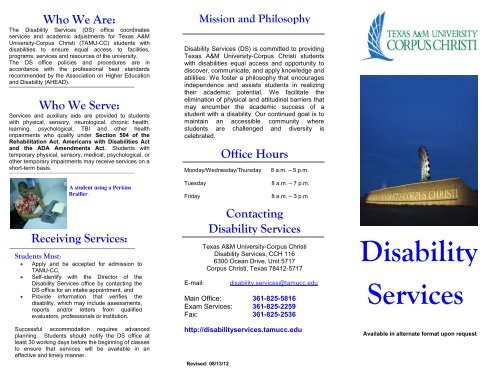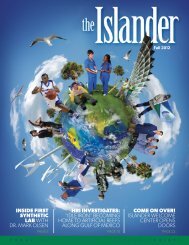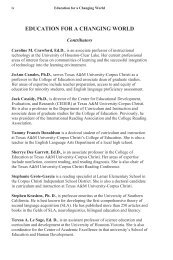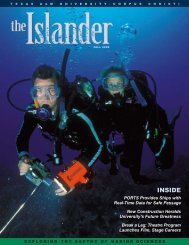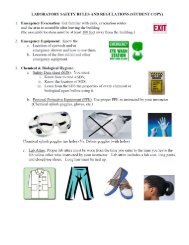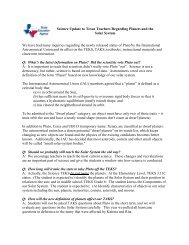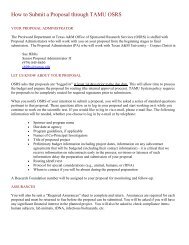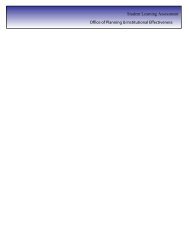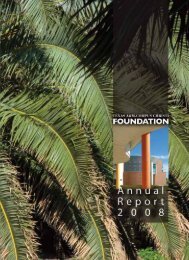Printable Brochure (PDF) - Disability Services
Printable Brochure (PDF) - Disability Services
Printable Brochure (PDF) - Disability Services
You also want an ePaper? Increase the reach of your titles
YUMPU automatically turns print PDFs into web optimized ePapers that Google loves.
Who We Are:The <strong>Disability</strong> <strong>Services</strong> (DS) office coordinatesservices and academic adjustments for Texas A&MUniversity-Corpus Christi (TAMU-CC) students withdisabilities to ensure equal access to facilities,programs, services and resources of the university.The DS office policies and procedures are inaccordance with the professional best standardsrecommended by the Association on Higher Educationand <strong>Disability</strong> (AHEAD).Who We Serve:<strong>Services</strong> and auxiliary aids are provided to studentswith physical, sensory, neurological, chronic health,learning, psychological, TBI and other healthimpairments who qualify under Section 504 of theRehabilitation Act, Americans with Disabilities Actand the ADA Amendments Act. Students withtemporary physical, sensory, medical, psychological, orother temporary impairments may receive services on ashort-term basis.A student using a PerkinsBrailler.Receiving <strong>Services</strong>:Students Must:Apply and be accepted for admission toTAMU-CC,Self-identify with the Director of the<strong>Disability</strong> <strong>Services</strong> office by contacting theDS office for an intake appointment, andProvide information that verifies thedisability, which may include assessments,reports and/or letters from qualifiedevaluators, professionals or institution.Successful accommodation requires advancedplanning. Students should notify the DS office atleast 30 working days before the beginning of classesto ensure that services will be available in aneffective and timely manner.Mission and Philosophy<strong>Disability</strong> <strong>Services</strong> (DS) is committed to providingTexas A&M University-Corpus Christi studentswith disabilities equal access and opportunity todiscover, communicate, and apply knowledge andabilities. We foster a philosophy that encouragesindependence and assists students in realizingtheir academic potential. We facilitate theelimination of physical and attitudinal barriers thatmay encumber the academic success of astudent with a disability. Our continued goal is tomaintain an accessible community wherestudents are challenged and diversity iscelebrated.Office HoursMonday/Wednesday/ThursdayTuesdayFridayE-mail:8 a.m. – 5 p.m.8 a.m. – 7 p.m.8 a.m. – 3 p.m.Contacting<strong>Disability</strong> <strong>Services</strong>Texas A&M University-Corpus Christi<strong>Disability</strong> <strong>Services</strong>, CCH 1166300 Ocean Drive, Unit 5717Corpus Christi, Texas 78412-5717disability.services@tamucc.eduMain Office: 361-825-5816Exam <strong>Services</strong>: 361-825-2259Fax: 361-825-2536http://disabilityservices.tamucc.eduRevised: 08/13/12<strong>Disability</strong><strong>Services</strong>Available in alternate format upon request
Note-Taking <strong>Services</strong>Permission may be given to audio-record classlectures.Volunteer note-takers are recruited to assist inobtaining class notes.Provision of note-taking paper (NCR Paper)Examination <strong>Services</strong>Examination services and accommodations areprovided to ensure that evaluation methods representthe student’s ability rather than the disability.Dependent on the nature of the course, disability anddocumentation, exam accommodations may include:Extended timeReduced distraction areaComputers for essaysReaders and/or scribesAlternate FormatLiaison <strong>Services</strong>The <strong>Disability</strong> <strong>Services</strong> (DS) Staff serves as a liaison toTexas A&M University-Corpus Christi faculty, staff, andadministration; as well as to vocational rehabilitationagencies working with students, including:Corpus Christi Area Council for the Deaf, Inc.Department of Assistive and Rehabilitation<strong>Services</strong>, Division of Rehabilitation <strong>Services</strong>Department of Assistive and Rehabilitation<strong>Services</strong>, Division of Blind <strong>Services</strong>Mental Health <strong>Services</strong> (MHMR)Veterans Administration (VA)Assistive Technology<strong>Services</strong> ProvidedUser support for assistive equipment and softwareAssistance in obtaining books on CD or in digitalformatAssistive Technology study and training labEquipment and AidsEquipment is provided for on-campus use. All requests forauxiliary aids must be made through the DS office.Assistive listening devicesDigital RecordersTTD/TTY equipment on campusUbiDuo Communication Device for Deaf/HOHCCTVs (Video Magnifiers)Adjustable computer workstations and chairsAlternative computer input devicesDaisy ReadersAssistive SoftwareText to Speech SoftwareScreen Magnification SoftwareScreen Reader SoftwareVoice Input SoftwareNote-taking SoftwareOther equipment and software are available asappropriate and reasonable for specific disabilities.For more information please visit theDS website:http://disabilityservices.tamucc.eduOr call for an appointment:361-825-5816Documentation GuidelinesIt is the responsibility of the student to provide information thatverifies that the student's condition meets the definition of adisability as defined by applicable laws (i.e., Section 504 of theRehabilitation Act of 1973, the Americans with Disabilities Actof 1990 and the ADA Amendments Act of 2008). Federal Lawrequires that requests for services for students with disabilitiesbe considered on an individual, case-by-case basis.Sources of information used for determining a disability and/oraccommodations may include a student’s self-report, directobservation and interaction with the student, and/ordocumentation from qualified evaluators or professionals.Student Self-Report:Students should complete the Application for <strong>Services</strong>, whichprovides students an opportunity to describe their disability andaccommodations they are hoping to receive. Students maysupplement the Application with an additional narrative byproviding a letter that further describes their disability and/oraccommodations they are requesting. Students may considerincluding information about their experiences related to theirdisability, barriers faced, and/or previous accommodations(effective or ineffective).Documentation:<strong>Disability</strong> related documentation should provide information onthe functional impact of the disability so that effectiveaccommodations can be identified. Criteria for the source,scope and content of documentation differs by disability type.Documentation may include assessments, reports, and/orletters from qualified evaluators, professionals, or institutions.Common sources of documentation are health care providers,psychologists, diagnosticians, and/or information from aprevious school (e.g., accommodation agreements/letters, 504,IEP, or ARD documents).Suggested Documentation Elements:1. Typed on letterhead, dated, and signed by a qualifiedprofessional2. Diagnostic Statement with any related diagnosticmethodology (diagnostic criteria and/or procedures)3. Functional limitations or symptoms4. Severity and/or expected progression5. Current medication(s) and any related side-effects6. Current and/or past accommodations7. Any recommended accommodationsGeneral grievance and Complaint Resolution procedurescan be found at:http://www.tamucc.edu/marcom/complaints/


